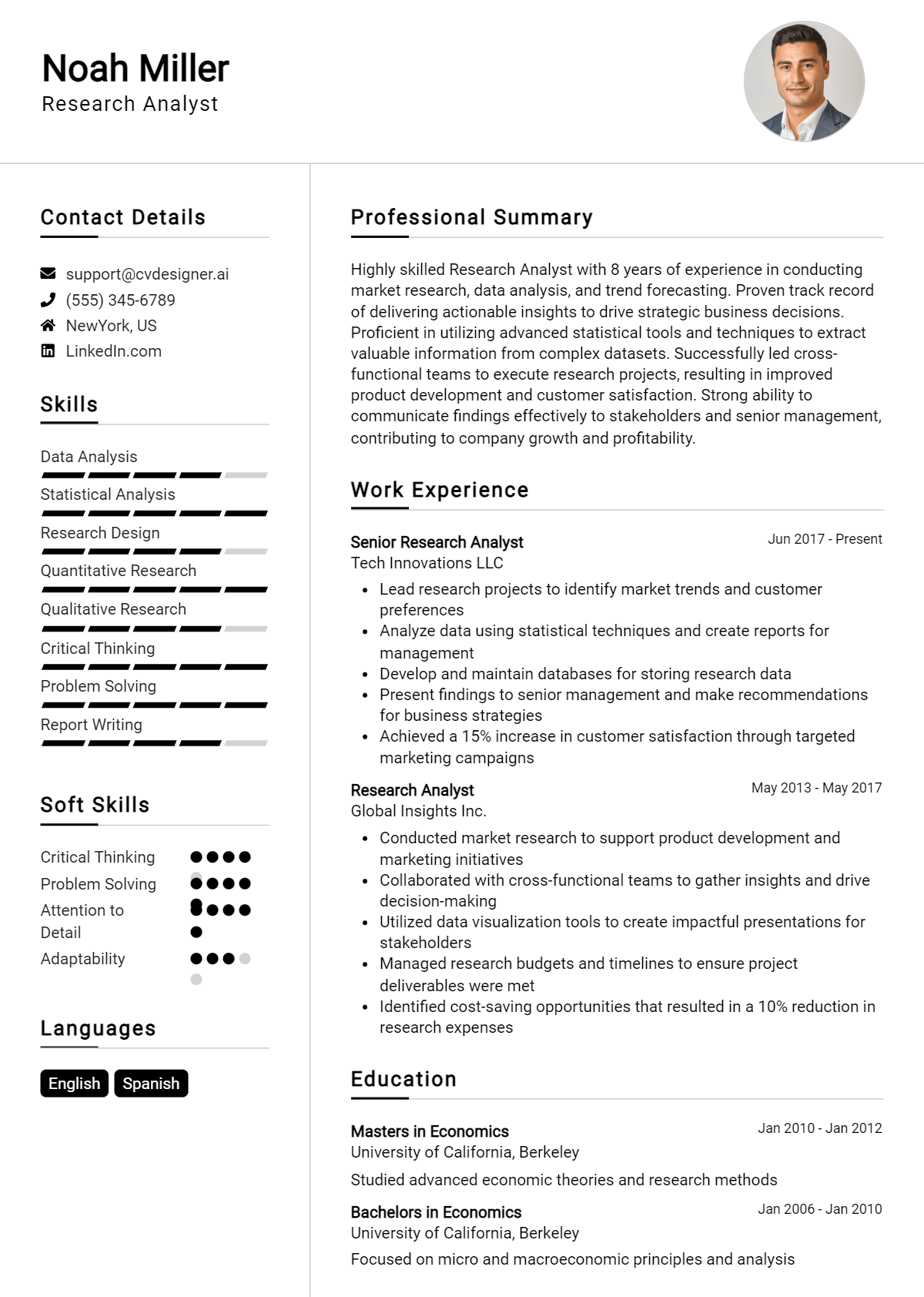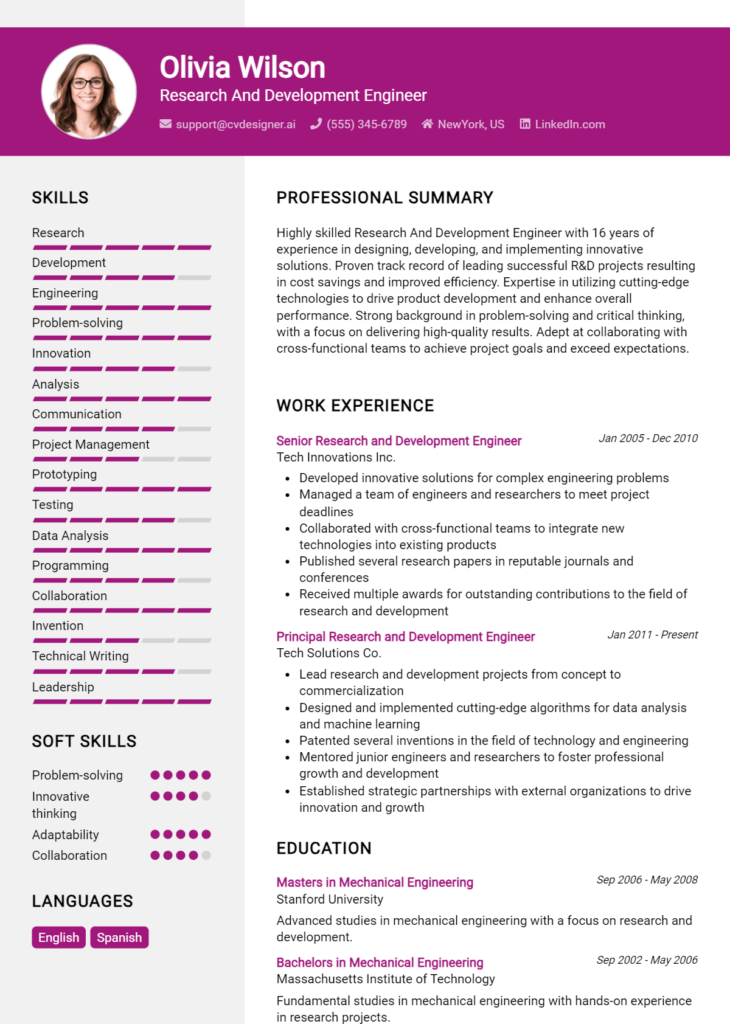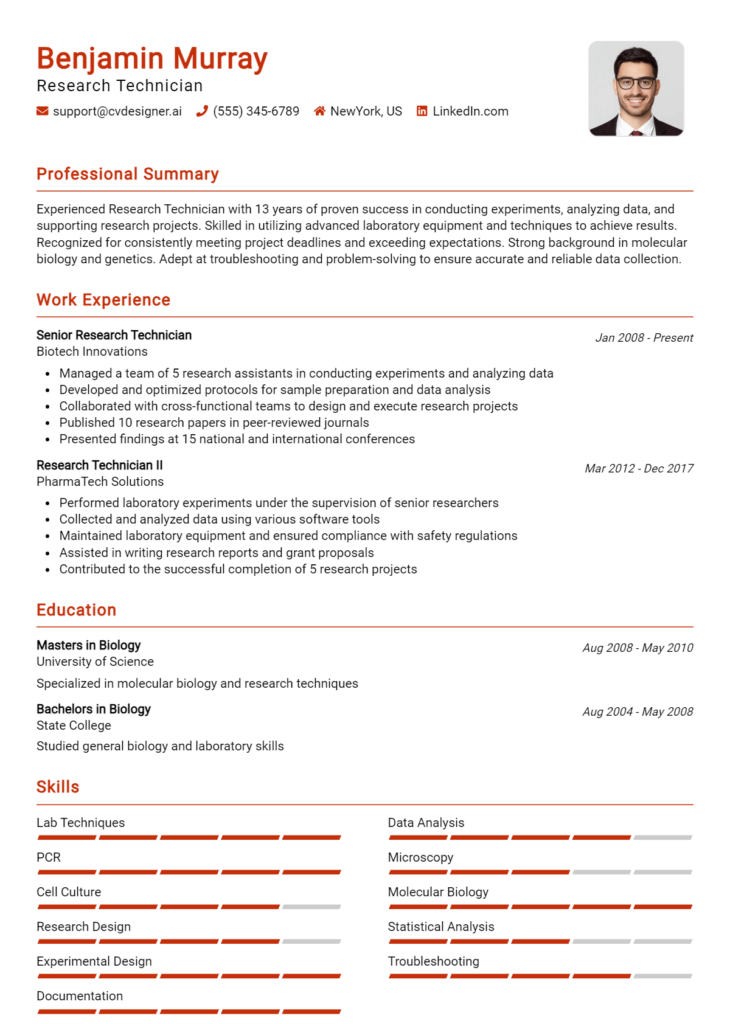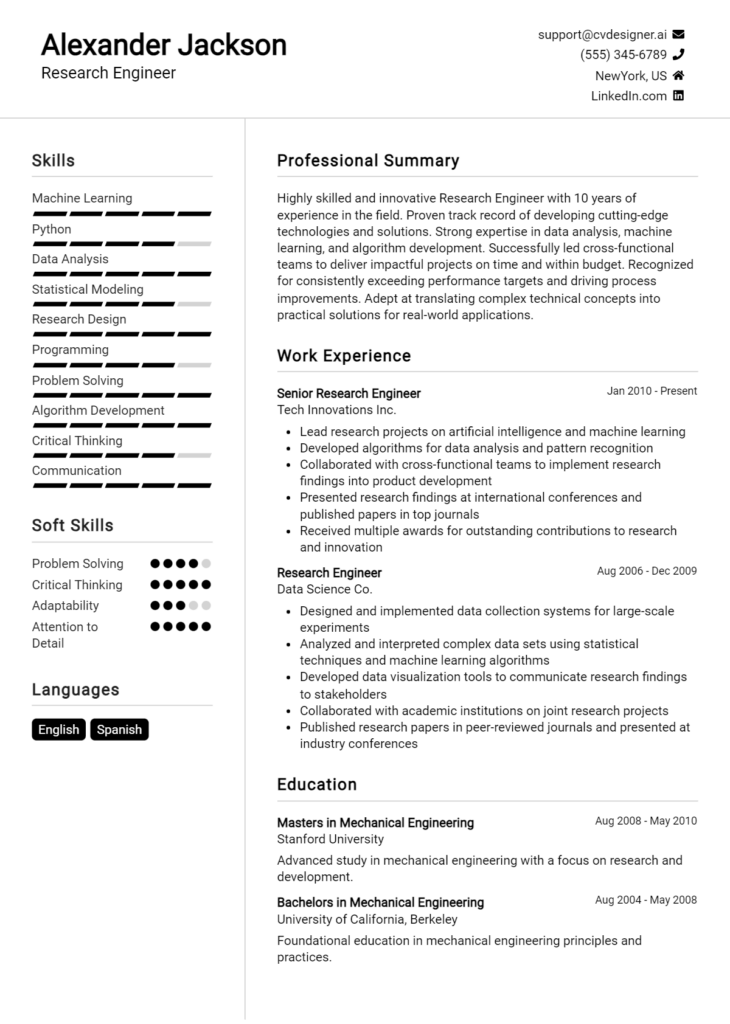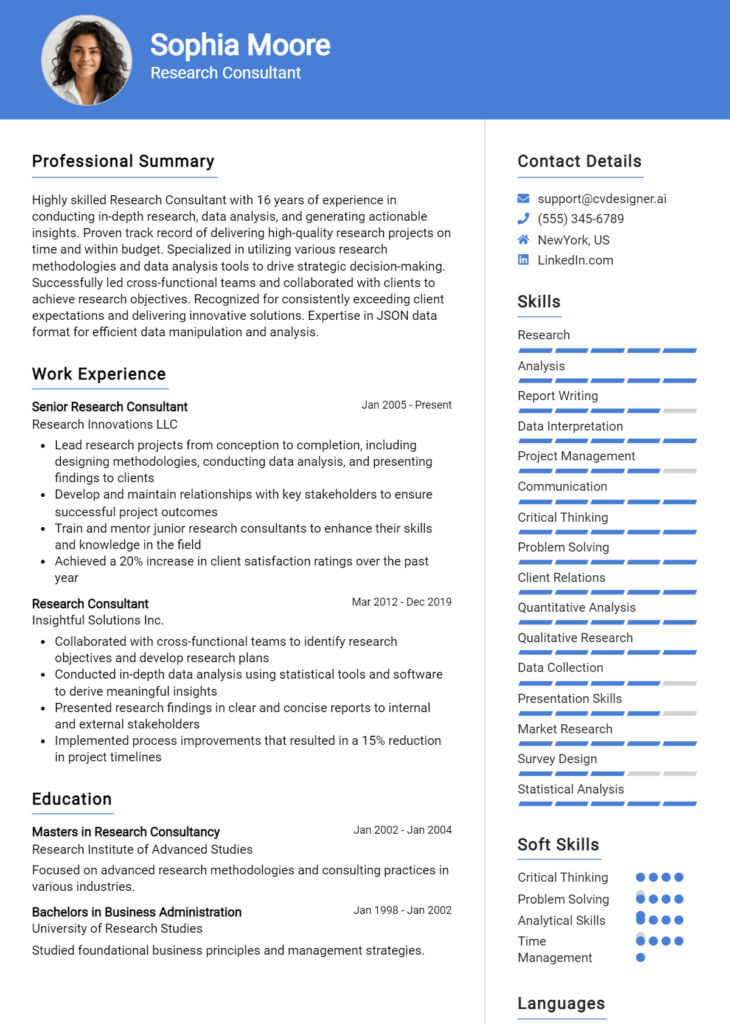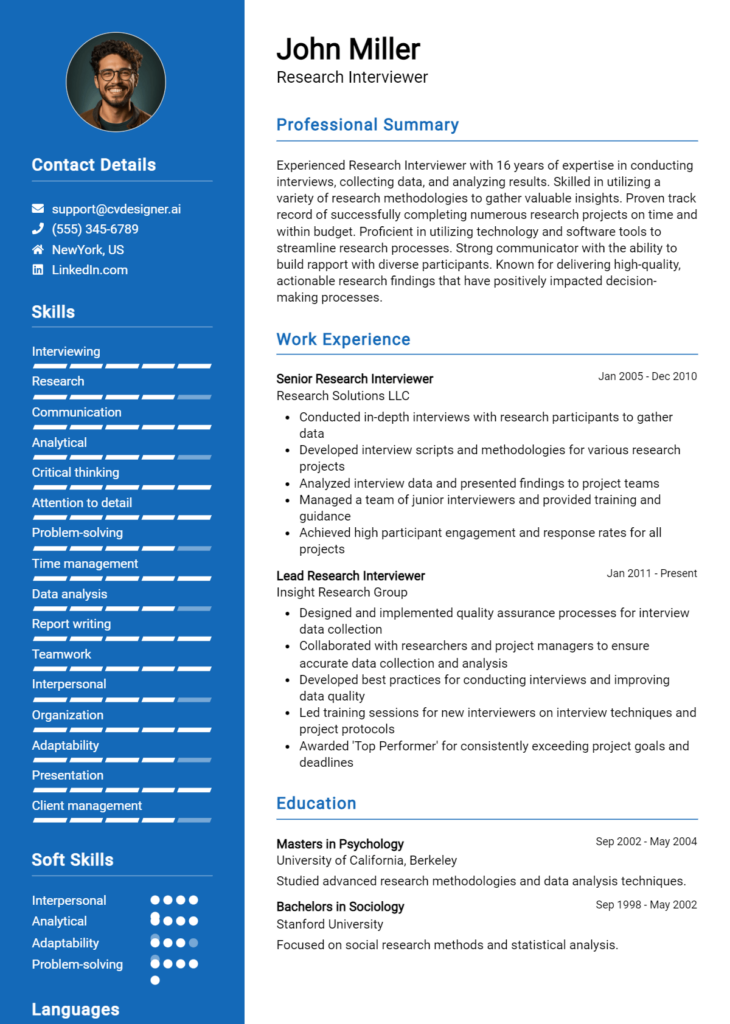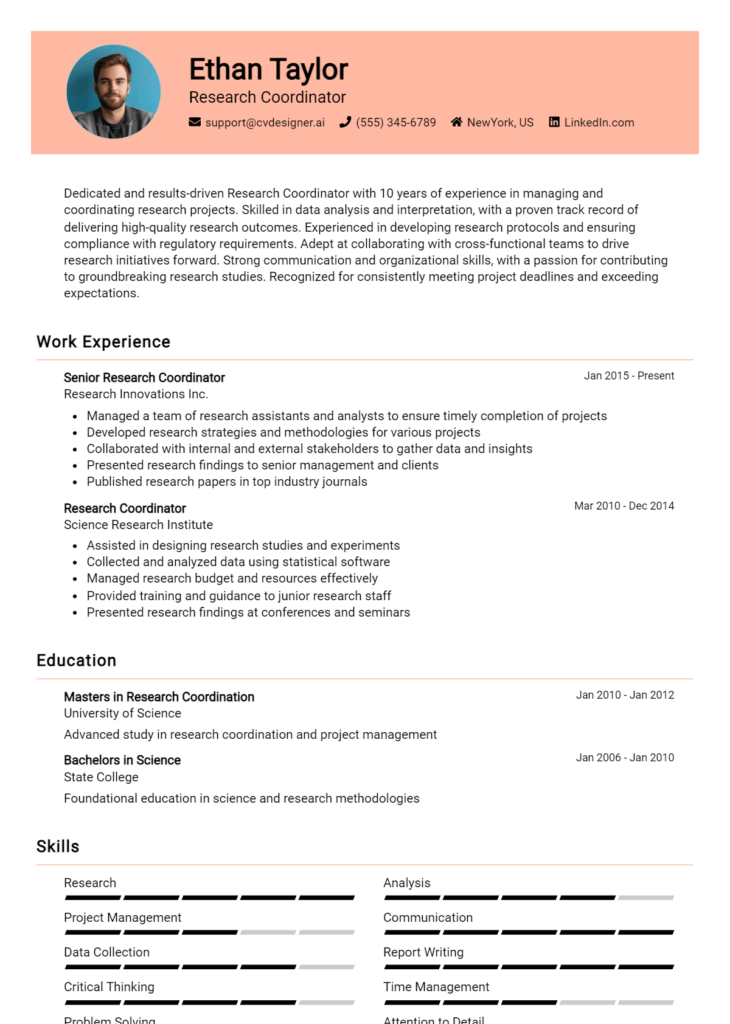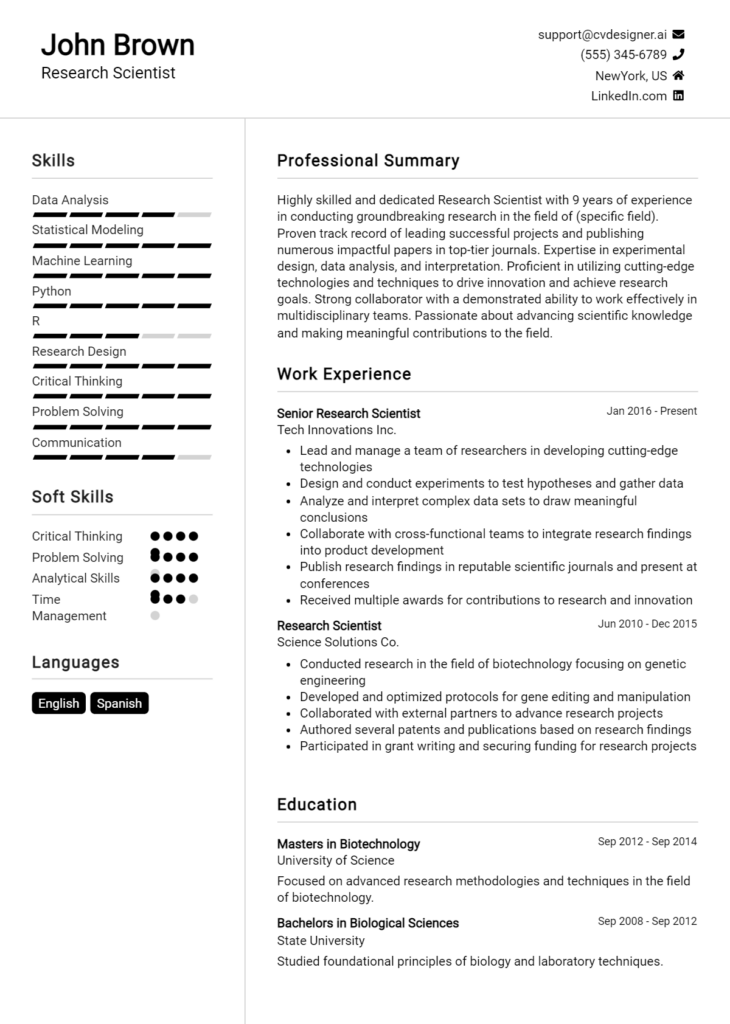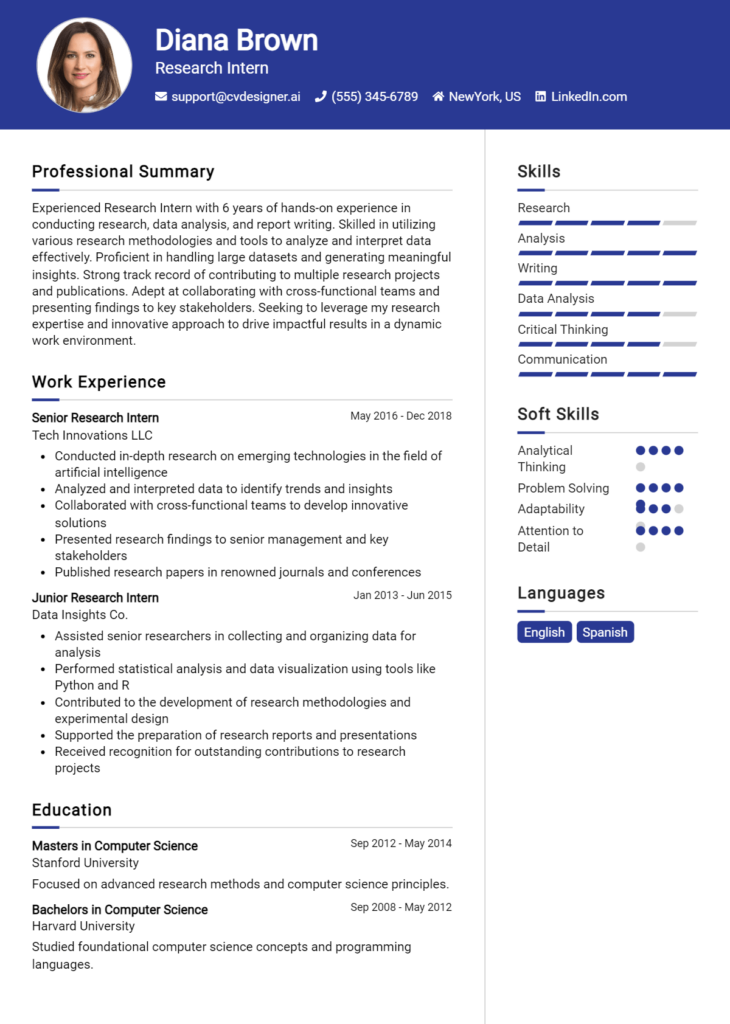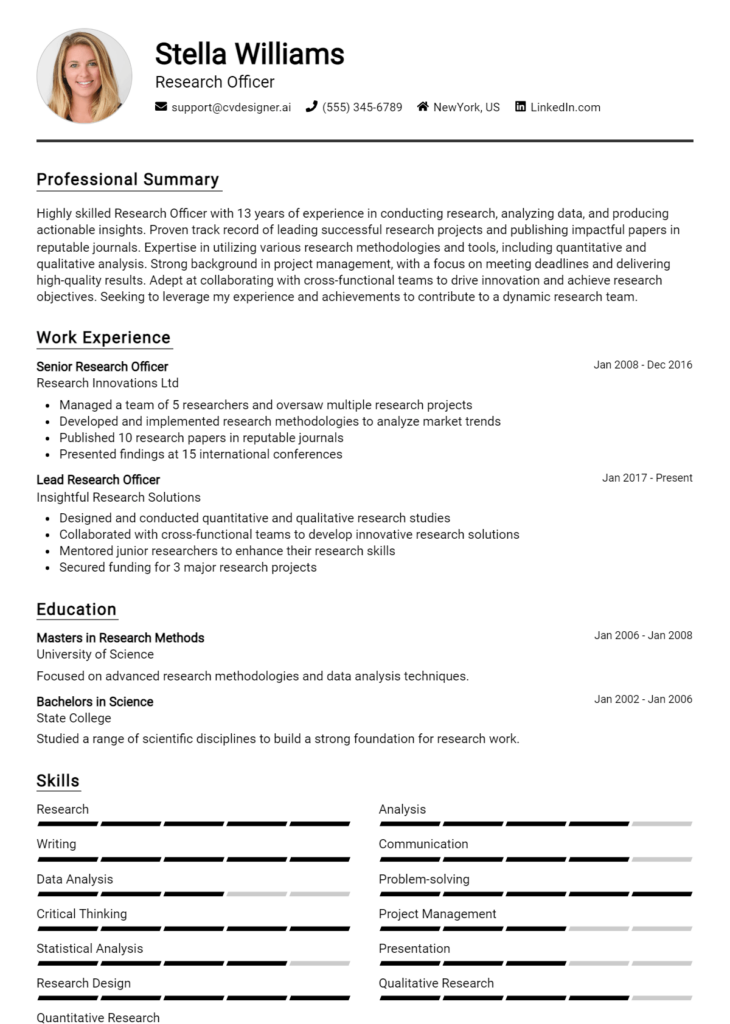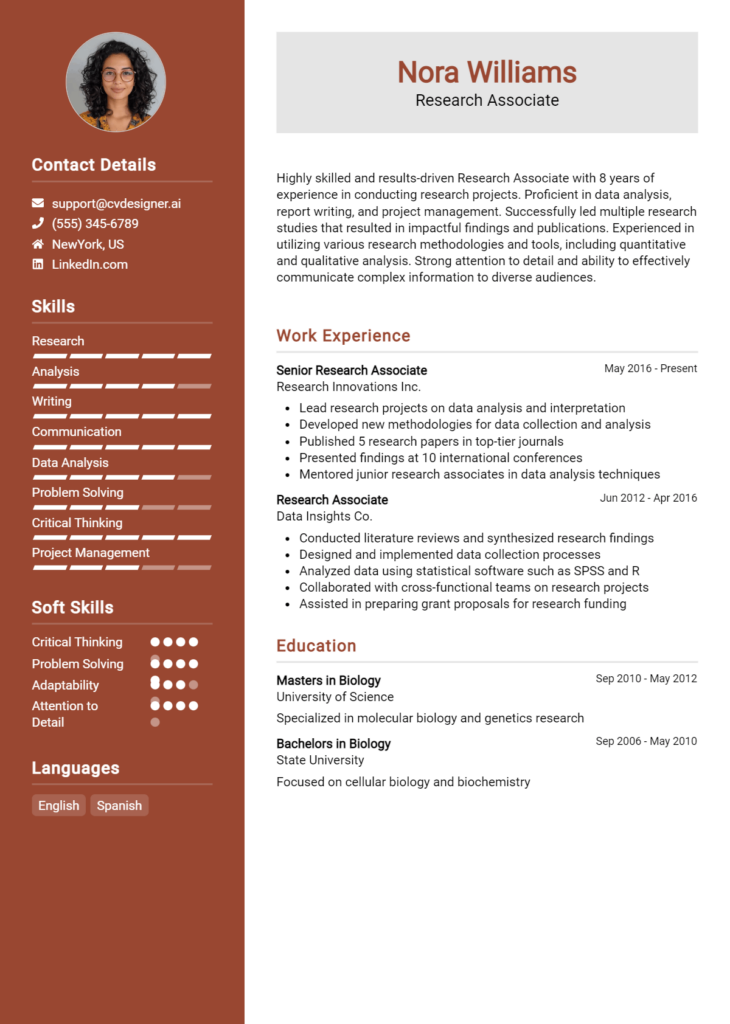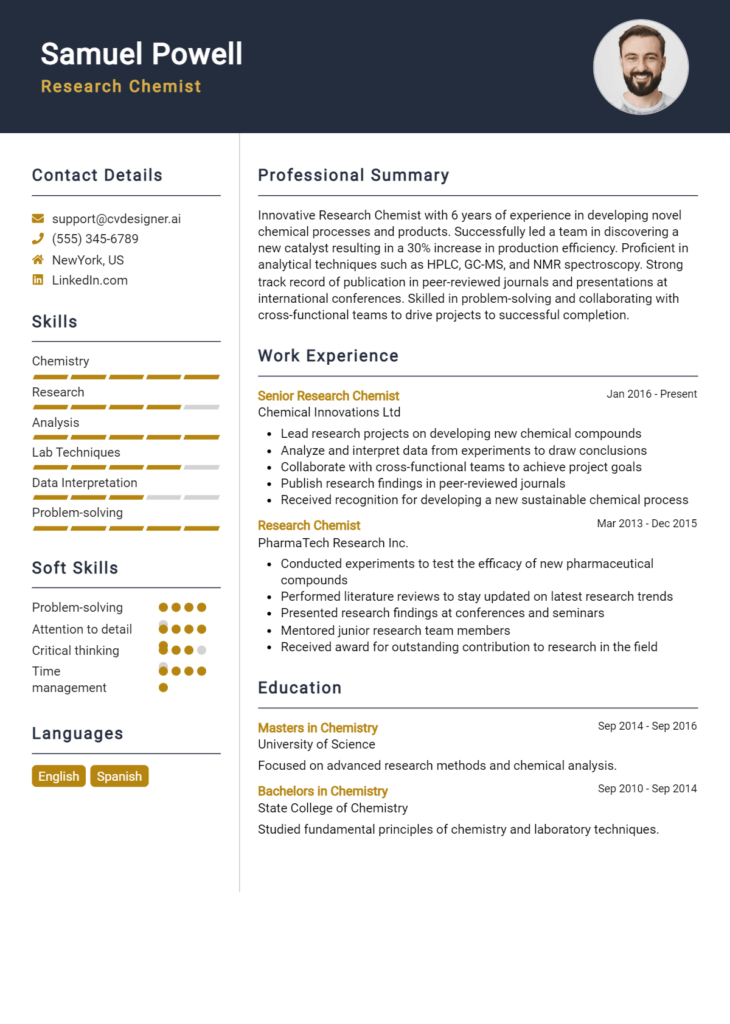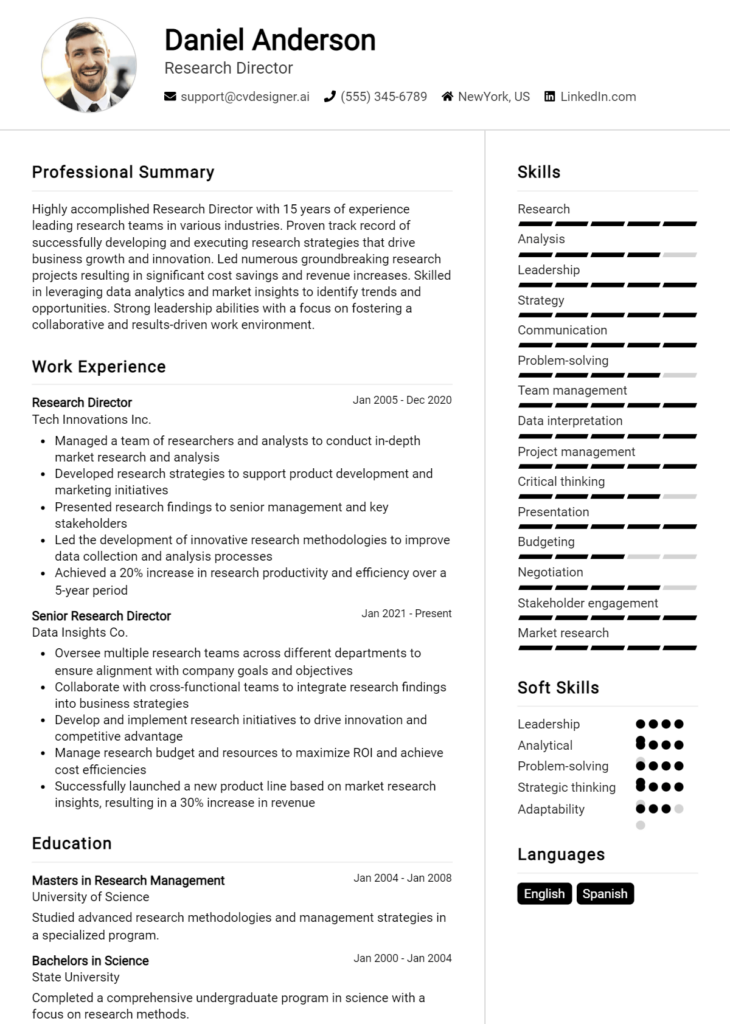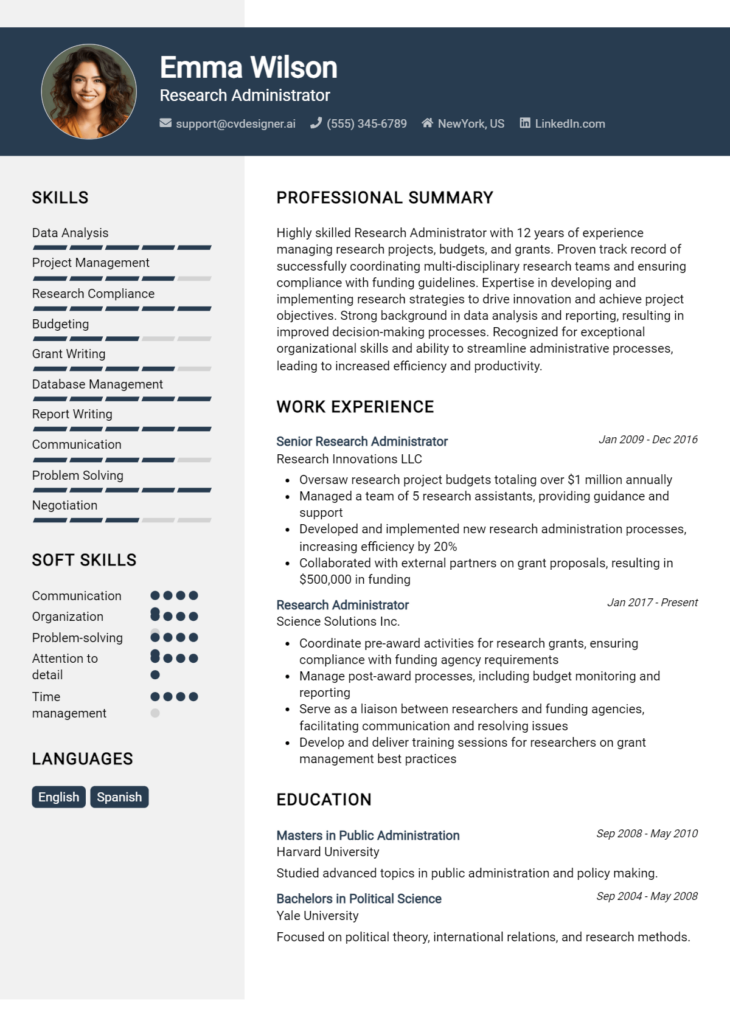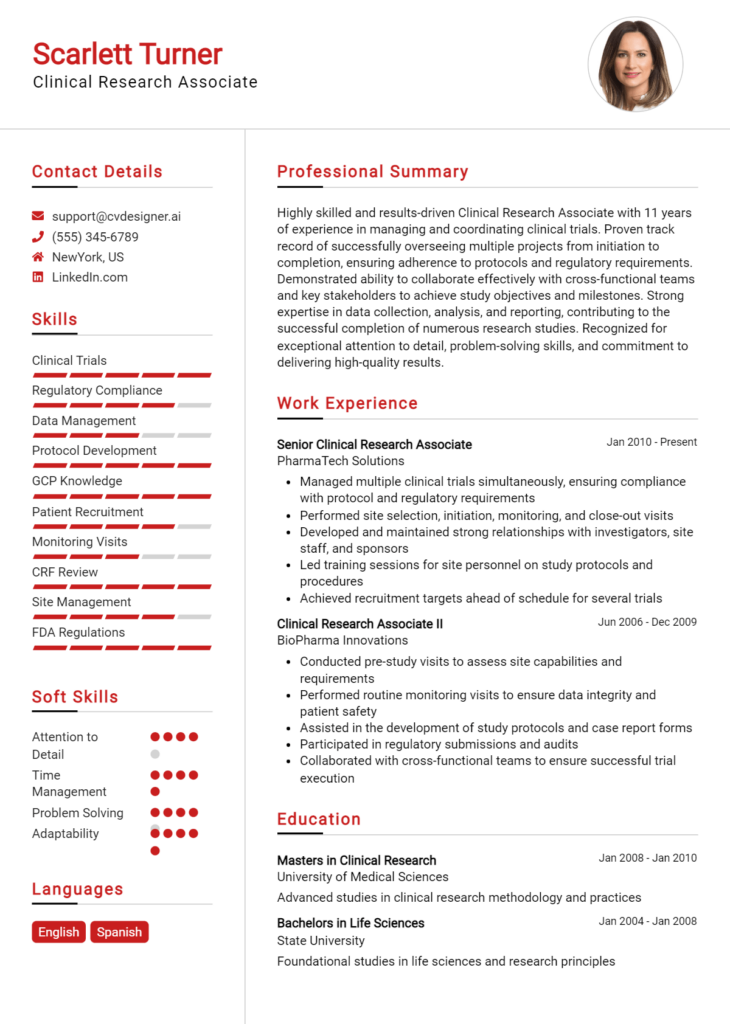Most Popular Research Analyst Resume Examples
Explore additional Research Analyst resume samples and guides and see what works for your level of experience or role.
As a Research Analyst, you play a crucial role in transforming data into actionable insights that drive decision-making across industries. Your analytical skills and ability to interpret complex information make you an invaluable asset to any organization. However, to stand out in a competitive job market, a well-crafted resume is essential. It serves as your first impression, showcasing your expertise, experience, and potential. In this comprehensive guide, we will delve into the nuances of writing a compelling Research Analyst resume that captures the attention of hiring managers and sets you apart from the competition.
Throughout this article, we will cover key responsibilities and skills that define the Research Analyst role, helping you articulate your experience effectively. We’ll discuss the best formats to use for your resume, ensuring it is both visually appealing and easy to read. Additionally, we will highlight common mistakes to avoid, so you can refine your document and enhance your chances of landing an interview. You’ll find resume examples tailored for all experience levels, from entry-level to seasoned professionals, along with actionable tips on writing an impactful resume. Finally, we will guide you in selecting the right resume templates to complement your personal brand and make a lasting impression. Let’s embark on this journey to create a standout Research Analyst resume!
Key Responsibilities and Skills for a Research Analyst
As a Research Analyst, you play a crucial role in gathering, analyzing, and interpreting data to support business decisions and strategic planning. Your key responsibilities include:
- Conducting comprehensive research using various methodologies, including qualitative and quantitative analysis.
- Analyzing data to identify trends, patterns, and insights that inform business strategies.
- Preparing detailed reports and presentations to communicate findings to stakeholders clearly and effectively.
- Collaborating with cross-functional teams to understand their research needs and provide actionable insights.
- Staying updated on industry trends and market developments to ensure research relevance.
To excel in this role, certain skills are essential:
- Strong analytical abilities to interpret complex data sets.
- Proficiency in statistical software and data visualization tools.
- Excellent written and verbal communication skills to convey research findings.
- Attention to detail to ensure accuracy in data analysis and reporting.
- Problem-solving skills to address research challenges and identify solutions.
- Time management skills to handle multiple projects and deadlines efficiently.
Highlighting these skills effectively in the resume skills section is vital for showcasing your qualifications to potential employers. Tailoring these responsibilities and skills to align with the specific job description will demonstrate your fit for the position and your understanding of the role's requirements. Additionally, consider how these skills can be reflected in your CV to create a compelling narrative about your expertise and value as a Research Analyst.
Best Resume Format and Structure for a Research Analyst
When preparing a resume for a Research Analyst position, it’s essential to adopt a format that not only presents your qualifications clearly but also highlights your analytical skills effectively. Here’s a detailed guide on the best resume format and structure for a Research Analyst.
Contact Information
- Always place your contact information at the top of your resume.
- Include your full name, phone number, email address, and LinkedIn profile (if applicable).
- Ensure that your email address is professional and simple.
Professional Summary
- Write a brief professional summary (2-4 sentences) that encapsulates your experience, key skills, and what you bring to the role.
- Tailor this section to the specific job you are applying for, emphasizing your analytical abilities and relevant experiences.
- Use keywords from the job description to align your summary with the employer’s needs.
Work Experience
- List your work experience in reverse chronological order, starting with your most recent position.
- For each position, include the job title, the name of the company, location, and dates of employment.
- Use bullet points to describe your responsibilities and achievements, focusing on quantifiable outcomes.
- Highlight relevant experiences that demonstrate your research skills, such as data analysis, report writing, and project management.
Education
- Include your highest degree first, followed by any relevant certifications or additional studies.
- State the degree obtained, the major, the institution, and the graduation date.
- If you have recent or significant academic achievements, such as honors or research projects, consider including them.
Skills
- Create a dedicated skills section that contains both hard and soft skills relevant to a Research Analyst role.
- Include technical skills such as data analysis tools (e.g., Excel, SPSS, R, Python), research methodologies, and statistical analysis.
- Also, mention soft skills like critical thinking, communication, and attention to detail.
Certifications
- If you hold any relevant certifications (e.g., Certified Research Analyst, SAS Certified Data Scientist), list them in this section.
- This shows your commitment to professional development and expertise in the field.
Additional Tips
- Use a clean, professional layout with clear headings and consistent font styles.
- Choose a resume format (chronological, functional, or combination) that best showcases your experience and skills. For most Research Analysts, a chronological format is typically preferred as it emphasizes a solid career progression.
- Keep your resume to one page, especially if you have less than 10 years of experience.
Complementary Cover Letter Format
- A structured cover letter should accompany your resume, mirroring the professionalism of your resume.
- Start with your contact information, followed by the date and the employer's contact information.
- Use an introduction to express your interest in the position and briefly mention how your skills align with the job.
- In the body, elaborate on specific experiences from your resume, demonstrating how they make you a good fit for the role.
- Conclude with a strong closing statement that invites further discussion and reiterates your enthusiasm for the position.
By adhering to these guidelines, your resume will not only effectively communicate your qualifications but also complement your cover letter, creating a cohesive application package that stands out to potential employers.
Writing Tips and Best Practices for a Research Analyst Resume
When crafting a resume as a Research Analyst, it’s essential to present your skills and experiences in a clear, concise, and impactful manner. Highlight your analytical abilities, attention to detail, and proficiency in research methodologies. Utilize a professional format and ensure consistency throughout your document to make a great first impression. Remember to incorporate resume writing tips to enhance the visual appeal and readability of your resume. Additionally, these practices are equally valuable when drafting your cover letter, as they reinforce your candidacy through tailored content.
- Use action verbs such as “analyzed,” “evaluated,” “synthesized,” and “presented” to convey your contributions effectively.
- Quantify your achievements by including specific metrics, such as “increased data collection efficiency by 30%” or “managed a budget of $50,000 for research projects.”
- Incorporate industry-specific keywords relevant to research analysis, such as “data interpretation,” “statistical analysis,” and “market research,” to pass through applicant tracking systems.
- Tailor your resume for each job application by aligning your skills and experiences with the job description.
- Keep your resume to one or two pages, focusing on the most pertinent information and avoiding unnecessary details.
- Use bullet points for easy readability, allowing hiring managers to quickly identify your key qualifications.
- Highlight relevant software and tools you are proficient in, such as SPSS, R, or Excel, to showcase your technical skills.
- Include a summary statement at the top of your resume that encapsulates your experience and what you bring to the role, creating a strong opening for your application.
Common Mistakes to Avoid in a Research Analyst Resume
When crafting a resume for a Research Analyst position, it's essential to present your skills and experiences effectively. Many candidates make common mistakes that can undermine their chances of landing an interview. By avoiding these pitfalls, you can enhance your resume's clarity and impact, making it stand out to potential employers. Below are some prevalent mistakes to steer clear of:
- Overloading with Information: Including excessive details can overwhelm the reader; focus on relevant experiences and skills.
- Using Generic Descriptions: Generic job descriptions can make your resume blend in; tailor your language to reflect your unique contributions.
- Neglecting Keywords: Failing to incorporate industry-specific keywords may prevent your resume from passing through applicant tracking systems.
- Ignoring Formatting: A cluttered or inconsistent format can distract from your content; ensure a clean and professional layout.
- Lack of Quantifiable Achievements: Not providing metrics or specific outcomes can weaken your accomplishments; include numbers to demonstrate impact.
- Failing to Highlight Soft Skills: Research Analysts often need strong communication and teamwork skills; be sure to showcase these abilities.
- Using Passive Language: Passive voice can make your achievements seem less impactful; use active voice for a stronger presentation.
- Omitting Relevant Education or Certifications: Not listing pertinent educational qualifications can be a significant oversight in a research-focused role.
- Not Tailoring for Each Application: Sending the same resume for multiple jobs can reduce your chances; customize your resume for each specific position.
To further enhance your resume and ensure it meets professional standards, consider reviewing the common mistakes to avoid in a resume. Additionally, don't forget to examine common cover letter mistakes that should also be avoided, as a strong cover letter complements your resume and reinforces your candidacy.
Sample Research Analyst Resumes
As the demand for data-driven decision-making continues to grow across industries, the role of a Research Analyst has become increasingly vital. Whether you are an experienced professional looking to advance your career, an entry-level candidate eager to break into the field, or someone transitioning from a different profession, having a well-structured resume is essential. Below are three sample resumes tailored to different levels of experience and backgrounds, which can serve as a guide for crafting your own. For additional inspiration, be sure to explore more resume templates and corresponding cover letter examples to create a comprehensive job application package.
Experienced Research Analyst Resume Sample
Jessica Smith
1234 Maple Avenue
San Francisco, CA 94101
(555) 123-4567
jessica.smith@email.com
Professional Summary
Detail-oriented Research Analyst with over 7 years of experience in quantitative and qualitative research methodologies. Proven track record of analyzing complex datasets and delivering actionable insights to drive strategic decisions in marketing and product development. Strong communicator adept at presenting findings to stakeholders at all levels.
Experience
Senior Research Analyst
ABC Corp, San Francisco, CA
June 2018 – Present
- Led a team in conducting comprehensive market analyses that increased customer retention by 15%.
- Developed predictive models using statistical software to forecast sales trends, resulting in a 10% revenue growth.
- Presented findings to senior management, enhancing decision-making processes across various departments.
Research Analyst
XYZ Inc., San Francisco, CA
January 2015 – May 2018
- Conducted in-depth research on industry trends and competitor analysis, contributing to the successful launch of three new products.
- Collaborated with cross-functional teams to design and implement surveys, increasing customer feedback response rates by 20%.
- Authored reports that informed executive-level strategies, enhancing operational efficiencies.
Education
Master of Science in Data Analytics
University of California, Berkeley
Graduated: May 2014
Bachelor of Arts in Economics
University of California, Los Angeles
Graduated: May 2012
Skills
- Statistical Analysis Software (SPSS, R)
- Data Visualization Tools (Tableau, Power BI)
- Market Research Techniques
- Strong Presentation Skills
Entry-Level Research Analyst Resume Sample
Michael Taylor
5678 Oak Street
Los Angeles, CA 90001
(555) 987-6543
michael.taylor@email.com
Professional Summary
Motivated and analytical recent graduate with a Bachelor’s degree in Sociology and a strong foundation in research methodologies. Eager to apply academic knowledge and internship experience to contribute to data-driven projects as an entry-level Research Analyst.
Experience
Research Intern
Global Research Solutions, Los Angeles, CA
June 2022 – August 2022
- Assisted in data collection and analysis for a national survey on consumer behavior.
- Conducted literature reviews and synthesized findings into concise reports for the research team.
- Presented research findings in team meetings, gaining positive feedback for clarity and insight.
Academic Projects
Capstone Research Project
University of California, Los Angeles
September 2021 – May 2022
- Designed and implemented a qualitative study analyzing social media impact on youth engagement.
- Collected and analyzed data from over 100 participants, culminating in a comprehensive report with actionable recommendations.
Education
Bachelor of Arts in Sociology
University of California, Los Angeles
Graduated: May 2022
Skills
- Data Analysis (Excel, Google Sheets)
- Qualitative and Quantitative Research
- Strong Written and Verbal Communication
- Proficient in Microsoft Office Suite
Career Changer Research Analyst Resume Sample
Sarah Johnson
9101 Pine Lane
Chicago, IL 60601
(555) 654-3210
sarah.johnson@email.com
Professional Summary
Dynamic professional with 5 years of experience in project management seeking to transition into a Research Analyst role. Proven analytical skills and adept at managing data-driven projects, with a strong commitment to delivering high-quality results and insights.
Experience
Project Manager
Tech Innovations, Chicago, IL
January 2018 – Present
- Managed cross-functional teams to deliver technology projects on time and within budget, utilizing data analytics to drive project decisions.
- Developed and implemented project tracking tools that improved efficiency by 25%.
- Conducted post-project evaluations to gather data for future improvements, enhancing team performance.
Research Assistant (Volunteer)
Community Outreach Program, Chicago, IL
March 2021 – December 2021
- Assisted in collecting and analyzing data for community health initiatives, providing insights that informed program strategies.
- Created reports summarizing research findings, which were presented to stakeholders and community members.
Education
Bachelor of Science in Business Administration
University of Illinois, Chicago
Graduated: May 2017
Skills
- Data Management and Analysis (SQL, Excel)
- Project Management
- Problem Solving and Critical Thinking
- Excellent Communication and Interpersonal Skills
By tailoring your resume to reflect your experience and skills, you'll be well on your way to successfully applying for Research Analyst positions.
Checklist for a Research Analyst Resume
- Proofread for Errors: Carefully read through your resume to catch any spelling, grammar, or punctuation mistakes. Consider using tools like Grammarly to assist in this process.
- Consistent Formatting: Ensure that font styles, sizes, and colors are consistent throughout your resume. Use the same bullet points, spacing, and alignment to give it a polished look.
- Tailor to the Job: Customize your resume for each job application by including relevant skills, experiences, and keywords from the job description to demonstrate your fit for the role.
- Quantify Achievements: Where possible, include numbers and metrics to highlight your accomplishments (e.g., "Increased efficiency by 25%" or "Analyzed data sets of over 10,000 records").
- Clear Objective Statement: If applicable, include a concise objective statement that outlines your career goals and what you bring to the role of a Research Analyst.
- Relevant Skills Section: Highlight key skills that are relevant to the Research Analyst position, such as data analysis tools (e.g., Excel, R, Python), research methodologies, and communication skills.
- Professional Experience: Ensure that your work history is presented in reverse chronological order, focusing on roles that are relevant to research and analysis.
- Education Credentials: List your highest degree first, along with relevant coursework or certifications that pertain to research analysis.
- Use Action Verbs: Start each bullet point in your experience section with strong action verbs (e.g., "Conducted," "Led," "Developed") to convey your contributions effectively.
- Consider an AI Resume Builder: To ensure that all elements are well-organized and visually appealing, consider using an AI resume builder. It can help streamline the process of formatting and structuring your resume.
For creating a CV or cover letter, a similar checklist can also be followed to ensure quality and relevance. You can utilize resources like CV templates and cover letter templates for additional guidance.
Key Takeaways for a Research Analyst Resume Guide
In conclusion, crafting a strong Research Analyst resume is crucial for standing out in a competitive job market. By utilizing the provided examples and tips, you can effectively showcase your skills, experiences, and achievements. We encourage you to take the next steps by downloading a tailored resume template from resume templates or exploring our cover letter templates to further enhance your application materials. For those who prefer a more personalized touch, our best resume maker is an excellent resource to create a professional-looking resume effortlessly. Remember that adhering to similar guidelines will also assist you in drafting a compelling CV and an engaging cover letter. Take action now to elevate your job prospects and land your desired role as a Research Analyst!
